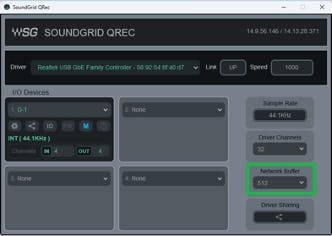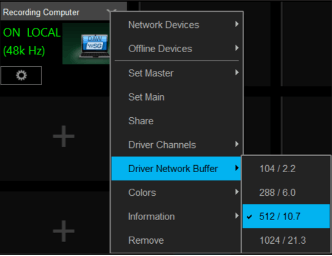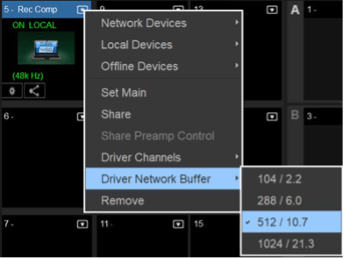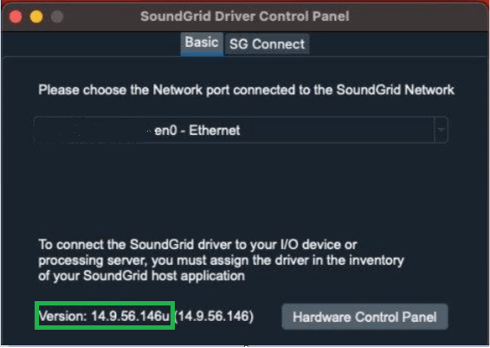SoundGrid Recording/Playback Tips for Apple Computers
Mar 26, 2024
Starting with Mac OS Ventura, network timing & priority infrastructure introduced some changes, affecting SoundGrid driver performance. As a result, using Apple computers for recording or playback with the SoundGrid driver may exhibit intermittent audio dropouts. Apple and Waves are working in collaboration towards fixing this issue. Still, there are many systems that record/playback with Mac computers flawlessly. This article presents recommendations to try if you are experiencing audio dropouts:
- We highly recommend using one of the approved ethernet > Thunderbolt adapters, to ensure highest possible priority by the operating system:
- Core Audio buffer size:
- Apple Silicon: Set the Core Audio buffer size to 128/256 samples or lower. This is done in the DAW’s preferences. Generally, lower buffer size utilizes the CPU better for audio tasks.
- Intel: Set the Core Audio buffer size to 512/1024 samples. This is done in the DAW’s preferences. Generally, higher buffer size uses less CPU.
- Set the Driver Network Buffer in your SoundGrid application to 512 samples. Here’s how –
QRec

SuperRack SoundGrid (Setup > Inventory)

eMotion LV1 (Setup > Inventory)

- In an eMotion LV1 or SuperRack setup, it is advised to user a separate computer for recording/playback.
- If using a laptop, make sure the it is connected to a power source and not running on battery power.
- To ensure SoundGrid applications and drivers operate uninterrupted, disable sleep/hibernation.
- Turn off Wi-Fi and Bluetooth.
- Close any unnecessary programs running in the background.
- Disable Energy Efficient Ethernet in your Mac’s network settings.
- Apple Silicon: Make sure that the DAW you are using is fully supported with the Apple Silicon architecture. If possible, test another DAW and check if the behavior changes.
- Apple Silicon: The default security settings of Apple Silicon Macs only allows installation of ‘user mode’ drivers, and does not allow installation of Kernel Extension (kext) drivers. The SoundGrid driver installs both ‘user mode’ and Kernel Extension drivers, but the active mode is determined by the computer’s security settings. If the driver is in user mode and you are experiencing issues, change it to Kernel Extension by following the instructions in this link (Use Kernel Driver with reduced Security Policy section). How do you know which mode is currently active? If the driver is running in user mode, a lower case ‘u’ is added to the version number at the bottom of the SoundGrid Driver Control Panel:

Need further assistance? contact Technical Support.
false
false
This content is not available in your country.
PRODUCTION
64e6aabf-dbe3-47cf-989b-ed43c2c6c9fd
https://media.wavescdn.com
public
https://register.waves.com
b705eb6e-5be8-46d1-a9e3-8fbf47be7a04
y
<div class="msg-box text-left mb-12">You may find this content helpful: To be able to view it, <a href="/legal/cookie-policy" target="_top" title="">allow Performance Cookies here</a>.</div>
d2d98ba1-ce9f-4d10-b6e3-eecc112a460e
True
Start Free
true
true
voTekqO2wEJBRRQbsEWTHeJEaV5FbTWvet3JZATG
652445
6LeG-IcUAAAAAIb42eguHdUztlZNcrLPhuk81WSM
6LftoDMUAAAAAC9QpaYXNehGHSu__XxRJyFAIgkJ
6LeIxAcTAAAAAJcZVRqyHh71UMIEGNQ_MXjiZKhI
16
9
2024
7
3
42
80
30
#000000
#fff
#fff
#000
#e8e8e8
{
"old": {
"before": [{
"text": "Waves Creative Access",
"link": "/subscriptions",
"design": "link"
}, {
"text": "Start Free",
"link": "/subscriptions",
"design": "button"
}
],
"beforeOlm": [{
"text": "Online AI Mastering",
"link": "/online-mastering",
"design": "link"
}, {
"text": "Try Free",
"link": "/online-mastering",
"design": "button"
}
],
"topMenu": [{
"text": "Products",
"link": "/products",
"subMenu": [{
"sectionTitle": "Products",
"sectionItems": [{
"text": "Plugins",
"link": "/plugins"
}, {
"text": "Bundles",
"link": "/bundles"
}, {
"text": "Waves Creative Access",
"link": "/subscriptions"
}, {
"text": "Online Mastering",
"link": "/online-mastering"
}, {
"text": "StudioVerse",
"link": "/studioverse"
}, {
"text": "Mixers & Racks",
"link": "/mixers-racks"
}, {
"text": "Hardware",
"link": "/hardware"
}, {
"text": "Courses",
"link": "/courses"
}, {
"text": "System Builder",
"link": "/system-builder"
}
]
}
]
}, {
"text": "Solutions",
"link": "/solutions",
"subMenu": [{
"sectionTitle": "Studio",
"sectionItems": [{
"text": "Plugins",
"link": "/plugins"
}, {
"text": "Bundles",
"link": "/bundles"
}, {
"text": "Waves Creative Access",
"link": "/subscriptions"
}, {
"text": "Online Mastering",
"link": "/online-mastering"
}, {
"text": "StudioVerse",
"link": "/studioverse"
}
]
}, {
"sectionTitle": "Live Sound",
"sectionItems": [{
"text": "Live Sound",
"link": "/live-sound"
}, {
"text": "Houses of Worship",
"link": "/houses-of-worship"
}, {
"text": "Broadcast Audio",
"link": "/mixers-racks/cloud-mx-audio-mixer"
}, {
"text": "Commercial Audio",
"link": "/commercial-audio"
}
]
}, {
"sectionTitle": "Consumer Audio",
"sectionItems": [{
"text": "Waves Maxx",
"link": "https://maxx.com"
}
]
}
]
}, {
"text": "Downloads",
"link": "/downloads",
"subMenu": [{
"sectionTitle": "Downloads",
"sectionItems": [{
"text": "Waves Central",
"link": "/downloads/central"
}, {
"text": "All Downloads",
"link": "/downloads"
}
]
}
]
}, {
"text": "Support",
"link": "/support ",
"subMenu": [{
"sectionTitle": "Support",
"sectionItems": [{
"text": "Install & Activate Products",
"link": "/support/activate"
}, {
"text": "System Requirements",
"link": "/support/tech-specs/system-requirements"
}, {
"text": "All Support Articles",
"link": "/support"
}, {
"text": "Contact Us",
"link": "/contact-us"
}
]
}
]
}, {
"text": "Learn",
"link": "/learn",
"subMenu": [{
"sectionTitle": "Learn",
"sectionItems": [{
"text": "Videos",
"link": "/videos"
}, {
"text": "Blog",
"link": "/blog"
}, {
"text": "By Topic",
"link": "/tags"
}, {
"text": "Courses",
"link": "/courses"
}, {
"text": "News",
"link": "/news"
}, {
"text": "Artists",
"link": "/artists"
}, {
"text": "Events",
"link": "/events"
}, {
"text": "Forum",
"link": "https://forum.waves.com"
}
]
}
]
}, {
"text": "Specials",
"link": "/specials"
}
]
},
"new": {
"before": [{
"text": "Waves Creative Access",
"link": "/subscriptions",
"design": "link"
}, {
"text": "Start Free",
"link": "/subscriptions",
"design": "button"
}
],
"beforeOlm": [{
"text": "Online AI Mastering",
"link": "/online-mastering",
"design": "link"
}, {
"text": "Try Free",
"link": "/online-mastering",
"design": "button"
}
],
"topMenu": [{
"text": "Plugins",
"link": "/plugins"
}, {
"text": "Bundles",
"link": "/bundles"
}, {
"text": "All Products",
"link": "/products",
"subMenu": [{
"sectionTitle": null,
"sectionItems": [{
"text": "Plugins",
"link": "/plugins"
}, {
"text": "Bundles",
"link": "/bundles"
}, {
"text": "Waves Creative Access",
"link": "/subscriptions"
}, {
"text": "StudioVerse",
"link": "/studioverse"
}, {
"text": "Hardware",
"link": "/hardware"
}, {
"text": "Mixers & Racks",
"link": "/mixers-racks"
},
{
"text": "Courses",
"link": "/courses"
}
]
}, {
"sectionTitle": null,
"sectionItems": [{
"text": "Online Mastering",
"link": "/online-mastering"
}, {
"text": "Live Sound",
"link": "/live-sound"
}, {
"text": "Live System Builder",
"link": "/system-builder"
}, {
"text": "Houses of Worship",
"link": "/houses-of-worship"
}, {
"text": "Broadcast Audio",
"link": "/mixers-racks/cloud-mx-audio-mixer"
}, {
"text": "Commercial Audio",
"link": "/commercial-audio"
}, {
"text": "Waves Maxx",
"link": "https://maxx.com"
}
]
}
]
}, {
"text": "Downloads",
"link": "/downloads",
"subMenu": [{
"sectionTitle": "Downloads",
"sectionItems": [{
"text": "Waves Central",
"link": "/downloads/central"
}, {
"text": "All Downloads",
"link": "/downloads"
}
]
}
]
}, {
"text": "Support",
"link": "/support ",
"subMenu": [{
"sectionTitle": "Support",
"sectionItems": [{
"text": "Install & Activate Products",
"link": "/support/activate"
}, {
"text": "System Requirements",
"link": "/support/tech-specs/system-requirements"
}, {
"text": "All Support Articles",
"link": "/support"
}, {
"text": "Contact Us",
"link": "/contact-us"
}
]
}
]
}, {
"text": "Learn",
"link": "/learn",
"subMenu": [{
"sectionTitle": "Learn",
"sectionItems": [{
"text": "Videos",
"link": "/videos"
}, {
"text": "Blog",
"link": "/blog"
}, {
"text": "By Topic",
"link": "/tags"
}, {
"text": "Courses",
"link": "/courses"
}, {
"text": "News",
"link": "/news"
}, {
"text": "Artists",
"link": "/artists"
}, {
"text": "Events",
"link": "/events"
}, {
"text": "Forum",
"link": "https://forum.waves.com"
}
]
}
]
}, {
"text": "Specials",
"link": "/specials"
}
]
}
}
{
"topMenu": [
{
"id": "products",
"tabName": "Products",
"tabIcon": "<svg width='16' height='16' viewBox='0 0 16 16' fill='none' xmlns='http://www.w3.org/2000/svg'><path d='M14.1197 0.5C14.882 0.5 15.5 1.11797 15.5 1.88027V14.1197C15.5 14.882 14.882 15.5 14.1197 15.5H1.88027C1.11797 15.5 0.5 14.882 0.5 14.1197V1.88027C0.5 1.11797 1.11797 0.5 1.88027 0.5H14.1197ZM5.29545 3.22727C5.10718 3.22727 4.95455 3.3799 4.95455 3.56818L4.95442 8.07832C4.58286 8.23241 4.32168 8.59723 4.32168 9.02273C4.32168 9.44823 4.58286 9.81304 4.95442 9.96713L4.95455 11.75C4.95455 11.9383 5.10718 12.0909 5.29545 12.0909C5.48373 12.0909 5.63636 11.9383 5.63636 11.75L5.63644 10.0051C6.06461 9.88161 6.37762 9.48854 6.37762 9.02273C6.37762 8.55692 6.06461 8.16384 5.63644 8.04033L5.63636 3.56818C5.63636 3.3799 5.48373 3.22727 5.29545 3.22727ZM10.4773 3.22727C10.289 3.22727 10.1364 3.3799 10.1364 3.56818L10.136 4.57048C9.76272 4.72378 9.5 5.08948 9.5 5.51623C9.5 5.94299 9.76272 6.30869 10.136 6.46199L10.1364 11.75C10.1364 11.9383 10.289 12.0909 10.4773 12.0909C10.6656 12.0909 10.8182 11.9383 10.8182 11.75L10.8181 6.49767C11.2445 6.3731 11.5559 5.98085 11.5559 5.51623C11.5559 5.05162 11.2445 4.65937 10.8181 4.53479L10.8182 3.56818C10.8182 3.3799 10.6656 3.22727 10.4773 3.22727Z' fill='white'/></svg>",
"sections": [
{
"id": "products-1",
"orientation": "horizontal",
"type": "topLink",
"sectionItems": [
{
"text": "Waves Creative Access",
"link": "/subscriptions",
"type": "before"
},
{
"text": "Start Free",
"link": "/subscriptions",
"design": "button",
"type": "before"
},
{
"text": "Online AI Mastering",
"link": "/online-mastering",
"type": "beforeOlm"
},
{
"text": "Try Free",
"link": "/online-mastering",
"design": "button",
"type": "beforeOlm"
}
]
},
{
"id": "products-2",
"sectionItems": [
{
"text": "Specials",
"link": "/specials"
},
{
"text": "Plugins",
"link": "/plugins"
},
{
"text": "Bundles",
"link": "/bundles"
},
{
"text": "Online Mastering",
"link": "/online-mastering"
},
{
"text": "StudioVerse",
"link": "/studioverse"
},
{
"text": "Mixers & Racks",
"link": "/mixers-racks"
},
{
"text": "Hardware",
"link": "/hardware"
},
{
"text": "Courses",
"link": "/courses"
},
{
"text": "System Builder",
"link": "/system-builder"
}
]
}
]
},
{
"id": "solutions",
"tabName": "Solutions",
"tabIcon": "<svg width='17' height='16' viewBox='0 0 17 16' fill='none' xmlns='http://www.w3.org/2000/svg'><path d='M15.6614 5.71376L11.0526 5.04573L8.99067 0.881534C8.73882 0.372807 8.01109 0.372837 7.75925 0.881534L5.69741 5.04576L1.08857 5.71379C0.525445 5.79542 0.300608 6.48526 0.708078 6.88123L4.04289 10.1219L3.25601 14.6984C3.15988 15.2575 3.74857 15.6838 4.25226 15.4199L8.32742 13.2595L12.4503 15.4198C13.0013 15.6838 13.59 15.2574 13.4939 14.6984L12.7071 10.1219L16.0419 6.88114C16.4494 6.4852 16.2246 5.79536 15.6614 5.71376Z' fill='#C8C8C8'/></svg>",
"sections": [
{
"id": "solutions-1",
"sectionTitle": "Studio",
"sectionItems": [
{
"text": "Waves Creative Access",
"link": "/subscriptions"
},
{
"text": "Online Mastering",
"link": "/online-mastering"
},
{
"text": "StudioVerse",
"link": "/studioverse"
}
]
},
{
"id": "solutions-2",
"sectionTitle": "Live sound",
"sectionItems": [
{
"text": "Live Sound",
"link": "/live-sound"
},
{
"text": "Houses of Worship",
"link": "/houses-of-worship"
},
{
"text": "Broadcast Audio",
"link": "/mixers-racks/cloud-mx-audio-mixer"
},
{
"text": "Commercial Audio",
"link": "/commercial-audio"
}
]
},
{
"id": "solutions-3",
"sectionTitle": "Consumer Audio",
"sectionItems": [
{
"text": "Waves Maxx",
"link": "https://maxx.com"
}
]
}
]
},
{
"id": "downloads",
"tabName": "Downloads",
"tabIcon": "<svg width='20' height='20' viewBox='0 0 20 20' fill='none' xmlns='http://www.w3.org/2000/svg'><path fillRule='evenodd' clipRule='evenodd' d='M16.3023 3.71452C16.7781 4.19553 17.0869 4.81721 17.1812 5.48753C17.3934 6.9823 17.5 8.48996 17.5 9.99987C17.5 11.518 17.394 13.0344 17.1812 14.5374C17.0805 15.2066 16.7664 15.826 16.2853 16.3023C15.8043 16.7781 15.1826 17.0869 14.5123 17.1812C13.0176 17.3934 11.5099 17.5 9.99998 17.5C8.48181 17.5 6.96545 17.394 5.46244 17.1812C4.79324 17.0805 4.1739 16.7664 3.69752 16.2853C3.22173 15.8043 2.91294 15.1826 2.8186 14.5123C2.3938 11.5105 2.3938 8.46426 2.8186 5.46244C2.91939 4.79324 3.23346 4.1739 3.71452 3.69752C4.19553 3.22173 4.81721 2.91294 5.48753 2.8186C8.48936 2.3938 11.5356 2.3938 14.5374 2.8186C15.2066 2.91939 15.826 3.23346 16.3023 3.71452ZM9.98965 6.27462C9.69548 6.27462 9.43949 6.49659 9.43949 6.79156V10.2629L8.67255 9.56203C8.57091 9.46284 8.43171 9.40927 8.289 9.40927C8.14684 9.40927 8.00816 9.46243 7.90662 9.56089C7.79974 9.65457 7.73777 9.78689 7.73777 9.92719C7.73777 10.0681 7.8003 10.201 7.90808 10.2948L9.60589 11.8599C9.70756 11.9593 9.84685 12.0129 9.98965 12.0129C10.1325 12.0129 10.2718 11.9592 10.3734 11.8599L12.0726 10.2935C12.2906 10.0926 12.2906 9.76181 12.0726 9.56092C11.8606 9.36548 11.5201 9.3656 11.308 9.56092L10.5398 10.2629V6.79156C10.5398 6.49659 10.2838 6.27462 9.98965 6.27462ZM7.61239 13.2247C7.42949 13.2247 7.24507 13.2555 7.10386 13.3569C6.95469 13.464 6.875 13.6341 6.875 13.8624C6.875 14.0734 6.96018 14.228 7.11008 14.3226C7.24983 14.4107 7.43143 14.4375 7.61239 14.4375H12.3878C12.569 14.4375 12.754 14.4106 12.8975 14.3238C13.051 14.2309 13.1438 14.077 13.1438 13.8624C13.1438 13.6309 13.0571 13.4612 12.9037 13.3555C12.7586 13.2556 12.5709 13.2247 12.3878 13.2247H7.61239Z' fill='#C8C8C8'/></svg>",
"sections": [
{
"id": "downloads-1",
"sectionItems": [
{
"text": "Waves Central",
"link": "/downloads/central"
},
{
"text": "All Downloads",
"link": "/downloads"
}
]
}
]
},
{
"id": "support",
"tabName": "Support",
"tabIcon": "<svg width='15' height='14' viewBox='0 0 15 14' fill='none' xmlns='http://www.w3.org/2000/svg'><path d='M0.334961 2.66849C0.334961 1.37891 1.30871 0.333496 2.50989 0.333496H12.2331C13.4343 0.333496 14.4081 1.37891 14.4081 2.66849V9.12405C14.4081 10.4136 13.4343 11.459 12.2331 11.459H2.50989C1.30871 11.459 0.334961 10.4136 0.334961 9.12405V2.66849Z' fill='#C8C8C8'/><path d='M1.34381 13.5681C0.89844 13.8475 0.340081 13.5011 0.339202 12.9449L0.333009 9.02784C0.3322 8.51517 0.812515 8.16486 1.25258 8.35717L4.93655 9.96713C5.45211 10.1924 5.5025 10.9593 5.0216 11.261L1.34381 13.5681Z' fill='#C8C8C8'/></svg>",
"sections": [
{
"id": "support-1",
"sectionItems": [
{
"text": "Install & Activate Products",
"link": "/support/activate"
},
{
"text": "System Requirements",
"link": "/support/tech-specs/system-requirements"
},
{
"text": "All Support Articles",
"link": "/support"
},
{
"text": "Contact Us",
"link": "/contact-us"
}
]
}
]
},
{
"id": "learn",
"tabName": "Learn",
"tabIcon": "<svg width='19' height='15' viewBox='0 0 19 15' fill='none' xmlns='http://www.w3.org/2000/svg'><path d='M18.112 5.59106L18.9349 5.16679L9.88397 0.5L0.833008 5.16683L9.88397 9.83359L16.8778 6.22745V9.02294C16.7502 9.17096 16.6721 9.36449 16.6721 9.57668C16.6721 10.0399 17.0412 10.4167 17.4949 10.4167C17.9487 10.4167 18.3178 10.0399 18.3178 9.57668C18.3178 9.36445 18.2397 9.17096 18.1121 9.02294V5.59106H18.112Z' fill='#C8C8C8'/><path d='M9.88425 11.1788L4.31445 8.2915V11.9359C4.31445 13.444 6.80814 14.6665 9.88425 14.6665C12.9604 14.6665 15.4541 13.444 15.4541 11.9359V8.2915L9.88425 11.1788Z' fill='#C8C8C8'/></svg>",
"sections": [
{
"id": "learn-1",
"sectionItems": [
{
"text": "Videos",
"link": "/videos"
},
{
"text": "Blog",
"link": "/blog"
},
{
"text": "By Topic",
"link": "/tags"
},
{
"text": "Courses",
"link": "/courses"
},
{
"text": "News",
"link": "/news"
},
{
"text": "Artists",
"link": "/artists"
},
{
"text": "Events",
"link": "/events"
},
{
"text": "Forum",
"link": "https://forum.waves.com"
}
]
}
]
},
{
"id": "specials",
"tabName": "Specials",
"tabIcon": "<svg xmlns='http://www.w3.org/2000/svg' width='20' height='20' xml:space='preserve' baseProfile='tiny' overflow='visible' viewBox='0 0 20 20'><g fill='#C8C8C8'><path d='m19.26 10.61-9.19-9.17c-.33-.33-.76-.6-1.31-.83C8.21.38 7.71.27 7.26.27H1.92c-.45 0-.83.16-1.16.49-.33.32-.49.71-.49 1.15v5.34c0 .45.11.95.34 1.5.23.55.5.98.83 1.3l9.19 9.2c.32.32.7.48 1.16.48.44 0 .83-.16 1.17-.48l6.31-6.32c.32-.32.48-.7.48-1.16-.02-.44-.18-.83-.49-1.16zm-11.46.35c-.68.68-1.79.68-2.48 0-.68-.68-.68-1.79 0-2.48.68-.68 1.79-.68 2.48 0 .69.69.69 1.8 0 2.48zm2.99 2.92a.36.36 0 0 1-.21.11.385.385 0 0 1-.44-.32L8.99 6.61c-.04-.21.11-.41.32-.45.21-.03.41.11.44.32l1.15 7.06c.02.14-.02.26-.11.34zm3.43-2.42c-.68.68-1.79.68-2.48 0-.68-.68-.68-1.79 0-2.48.68-.68 1.79-.68 2.48 0 .68.69.68 1.8 0 2.48z'/><path d='M5.88 9.04c-.38.38-.38.99 0 1.38.38.38 1 .38 1.37 0 .38-.38.38-1 0-1.37a.957.957 0 0 0-1.37-.01zM12.3 9.54c-.38.38-.38 1 0 1.38.38.38.99.38 1.37 0 .38-.38.38-.99 0-1.38-.38-.38-1-.38-1.37 0z'/></g></svg>",
"url": "/specials",
"sections": [
{
"id": "specials-1",
"sectionItems": [
{
"text": "Specials",
"link": "/specials"
}
]
}
]
},
{
"id": "account",
"hasMembership": true,
"tabName": "Account",
"tabIcon": "<svg width='16' height='16' viewBox='0 0 16 16' fill='none' xmlns='http://www.w3.org/2000/svg'><mask id='mask0_1996_2457' style={{ maskType: 'alpha' }} maskUnits='userSpaceOnUse' x='0' y='0' width='16' height='16'><path d='M11.4709 3.95356C11.4709 5.8615 9.9277 7.40712 8.02278 7.40712C6.11787 7.40712 4.57471 5.8615 4.57471 3.95356C4.57471 2.04562 6.11787 0.5 8.02278 0.5C9.9277 0.5 11.4709 2.04562 11.4709 3.95356ZM7.86732 9.12903C10.7972 9.12903 14.3026 10.3499 15.236 12.3551C15.3901 12.6338 15.4738 12.931 15.4738 13.2448V14.6638C15.4738 15.0557 15.1015 15.3733 14.6423 15.3733C14.1831 15.3733 13.8108 15.0557 13.8108 14.6638L13.8109 13.985C13.6783 13.8329 13.5975 13.6306 13.5975 13.4086C13.5975 12.9067 13.09 12.3938 12.3154 11.9597C11.1472 11.4669 9.47713 11.1163 7.9906 11.1163C5.89132 11.1163 3.42594 11.8156 2.52376 12.6257L2.4851 12.6616C2.33791 12.8236 2.23298 12.9892 2.17896 13.1553C2.173 13.1853 2.17037 13.2151 2.17037 13.2448C2.17037 13.3126 2.15923 13.3781 2.13844 13.4402L2.13718 14.5209C2.13718 14.9936 2.09991 15.5 1.53225 15.5C0.96459 15.5 0.5 15.3234 0.5 14.8507V13.4086C0.5 13.34 0.502698 13.2722 0.508013 13.205L0.507443 13.2448C0.507443 13.0197 0.550483 12.8033 0.631498 12.596C1.34489 10.4481 4.82186 9.12903 7.86732 9.12903Z' fill='white'/></mask><g mask='url(#mask0_1996_2457)'><path d='M11.4709 3.95356C11.4709 5.8615 9.9277 7.40712 8.02278 7.40712C6.11787 7.40712 4.57471 5.8615 4.57471 3.95356C4.57471 2.04562 6.11787 0.5 8.02278 0.5C9.9277 0.5 11.4709 2.04562 11.4709 3.95356ZM7.86732 9.12903C10.7972 9.12903 14.3026 10.3499 15.236 12.3551C15.3901 12.6338 15.4738 12.931 15.4738 13.2448V14.6638C15.4738 15.0557 15.1015 15.3733 14.6423 15.3733C14.1831 15.3733 13.8108 15.0557 13.8108 14.6638L13.8109 13.985C13.6783 13.8329 13.5975 13.6306 13.5975 13.4086C13.5975 12.9067 13.09 12.3938 12.3154 11.9597C11.1472 11.4669 9.47713 11.1163 7.9906 11.1163C5.89132 11.1163 3.42594 11.8156 2.52376 12.6257L2.4851 12.6616C2.33791 12.8236 2.23298 12.9892 2.17896 13.1553C2.173 13.1853 2.17037 13.2151 2.17037 13.2448C2.17037 13.3126 2.15923 13.3781 2.13844 13.4402L2.13718 14.5209C2.13718 14.9936 2.09991 15.5 1.53225 15.5C0.96459 15.5 0.5 15.3234 0.5 14.8507V13.4086C0.5 13.34 0.502698 13.2722 0.508013 13.205L0.507443 13.2448C0.507443 13.0197 0.550483 12.8033 0.631498 12.596C1.34489 10.4481 4.82186 9.12903 7.86732 9.12903Z' fill='#C8C8C8'/></g><path fillRule='evenodd' clipRule='evenodd' d='M0.846525 12.8439C4.29332 10.6091 6.65657 9.4917 7.93629 9.4917C9.21729 9.4917 11.5906 10.5246 15.0564 12.5905L15.0562 12.5907C15.2648 12.7159 15.3992 12.9349 15.4165 13.1775C15.4543 13.7212 15.4731 14.2333 15.4731 14.7139C15.4731 14.7231 15.4731 14.7322 15.4731 14.7413C15.4724 15.1534 15.1376 15.4869 14.7255 15.4862C14.6552 15.486 14.5853 15.476 14.5091 15.4862C10.0093 15.4862 6.53019 15.4862 4.07177 15.4862C2.79023 15.4862 1.85097 15.4862 1.25401 15.4862C0.842136 15.4867 0.507733 15.1534 0.506836 14.7415V13.4697C0.50696 13.2171 0.634848 12.9818 0.846525 12.8439Z' fill='#C8C8C8'/></svg>",
"sections": [
{
"id": "account-1",
"sectionTitle": "My Account",
"sectionItems": [
{
"text": "Account",
"link": "/account"
},
{
"text": "My Products",
"link": "/account/products"
},
{
"text": "Plugins Picked for Me",
"link": "/my-recommended-products"
},
{
"text": "My Upgrades",
"link": "/account/upgrades"
},
{
"text": "Get Waves Update Plan",
"link": "/account/get-waves-update-plan"
},
{
"text": "Get Latest Version",
"link": "/account/get-latest-version"
},
{
"text": "Register New Products",
"link": "/account/register"
},
{
"text": "Register Upgrade",
"link": "/account/register-upgrade"
},
{
"text": "Register Second Licenses",
"link": "/account/register-second-licenses"
},
{
"text": "My Certifications",
"link": "/account/certifications"
},
{
"text": "Wish List",
"link": "/account/wishlist"
}
]
},
{
"id": "account-2",
"sectionTitle": "Free Stuff",
"sectionItems": [
{
"text": "My Coupons",
"link": "/coupons"
},
{
"text": "My Rewards",
"link": "/account/rewards"
},
{
"text": "My Events",
"link": "/account/events"
}
]
},
{
"id": "account-3",
"sectionTitle": "Settings",
"sectionItems": [
{
"text": "Personal Details",
"link": "/account/edit-personal-details"
},
{
"text": "StudioVerse Profile",
"link": "/account/edit-my-creator-profile"
},
{
"text": "About Me",
"link": "/account/profile"
},
{
"text": "Change Password",
"link": "/account/change-password"
},
{
"text": "Email Preferences",
"link": "/email-preferences"
},
{
"text": "My Credit Cards",
"link": "/account/credit-cards"
},
{
"text": "My Invoices",
"link": "/account/invoices"
}
]
}
]
}
]
}
[
[{
"text": "My Account",
"isTitle": true
}, {
"text": "Account",
"link": "/account"
}, {
"text": "My Products",
"link": "/account/products"
}, {
"text": "Plugins Picked for Me",
"link": "/my-recommended-products"
}, {
"text": "My Upgrades",
"link": "/account/upgrades"
}, {
"text": "Get Waves Update Plan",
"link": "/account/get-waves-update-plan"
}, {
"text": "Get Latest Version",
"link": "/account/get-latest-version"
}, {
"text": "Register New Products",
"link": "/account/register"
}, {
"text": "Register Upgrade",
"link": "/account/register-upgrade"
}, {
"text": "Register Second Licenses",
"link": "/account/register-second-licenses"
}, {
"text": "My Certifications",
"link": "/account/certifications"
}, {
"text": "Wish List",
"link": "/account/wishlist"
}, {
"text": "Free Stuff",
"isTitle": true,
"classes": "mt-4"
}, {
"text": "My Coupons",
"link": "/coupons"
}, {
"text": "My Rewards",
"link": "/account/rewards"
}, {
"text": "My Events",
"link": "/account/events"
}
],
[{
"text": "Settings",
"isTitle": true
}, {
"text": "Personal Details",
"link": "/account/edit-personal-details"
}, {
"text": "StudioVerse Profile",
"link": "/account/edit-my-creator-profile"
}, {
"text": "About Me",
"link": "/account/profile"
}, {
"text": "Change Password",
"link": "/account/change-password"
}, {
"text": "Email Preferences",
"link": "/email-preferences"
}, {
"text": "My Credit Cards",
"link": "/account/credit-cards"
}, {
"text": "My Invoices",
"link": "/account/invoices"
}
]
]
[{"bannerGUID":"d4286ff5-e6de-4b2f-8bc9-e96a46843f09","bannerDisplayName":"Iconic Sounds Sale - September 2024","bannerTypeGUID":"dd5f8368-6b03-465f-b570-48baddb35b08","typeName":"OfferFooter","bannerImage":"/images/footer-offer/2024/september/iconic-sounds-sale-sept-2024.jpg","bannerURL":"/iconic-sounds","bannerPriority":2,"bannerTitle":"Iconic Sounds Sale : Shop Plugins","gaValue":"iconic-sounds-sale-sept-2024"},{"bannerGUID":"2e76fc8a-3a6d-4461-8d47-240c619ea29b","bannerDisplayName":"Iconic Sounds Sale - Free Plugins Bonus - Sept 2024","bannerTypeGUID":"dd5f8368-6b03-465f-b570-48baddb35b08","typeName":"OfferFooter","bannerImage":"/images/footer-offer/2024/september/50-80-free-plugins-iconic-sounds-sale-sept-2024.jpg","bannerURL":"/free-plugins-spend-50-spend-80-sale-sept-2024","bannerPriority":3,"bannerTitle":"Free Plugin Bonus","gaValue":"50-80-free-plugins-iconic-sounds-sale-sept-2024"},{"bannerGUID":"ba16dbd5-bdde-40ea-8517-cb420402d004","bannerDisplayName":"V15 - June 2024","bannerTypeGUID":"dd5f8368-6b03-465f-b570-48baddb35b08","typeName":"OfferFooter","bannerImage":"/images/footer-offer/2024/august/v15-aug-2024.jpg","bannerURL":"/v15","bannerPriority":5,"bannerTitle":"New V15 - Update Now","gaValue":"v15-aug-2024"},{"bannerGUID":"e9238c9a-ec9b-4669-b6c9-12a38974902a","bannerDisplayName":"My Recommended Products","bannerTypeGUID":"dd5f8368-6b03-465f-b570-48baddb35b08","typeName":"OfferFooter","bannerImage":"/images/footer-offer/2023/november/my-recommended-products-bf.jpg","bannerURL":"/my-recommended-products","bannerPriority":6,"bannerTitle":"Personal Product Recommendations: See Products","gaValue":"my-recommended-products"},{"bannerGUID":"e6b77202-75d8-4086-b586-af00dc3c289a","bannerDisplayName":"Upgrades","bannerTypeGUID":"dd5f8368-6b03-465f-b570-48baddb35b08","typeName":"OfferFooter","bannerImage":"/images/footer-offer/2023/september/upgrades.jpg","bannerURL":"/account/upgrades","bannerPriority":7,"bannerTitle":"Upgrade to a Bigger Bundle: See Upgrades","gaValue":"upgrade-to-a-bigger-bundle"},{"bannerGUID":"ea199ed7-6491-4fdf-a563-6d75941a2ddc","bannerDisplayName":"OLM Release","bannerTypeGUID":"dd5f8368-6b03-465f-b570-48baddb35b08","typeName":"OfferFooter","bannerImage":"/images/footer-offer/2024/january/olm.jpg","bannerURL":"/online-mastering","bannerPriority":8,"bannerTitle":"Waves Online Mastering: Learn More","gaValue":"waves-online-mastering-learn-more"}]
0
[{"itemOrder":1,"tierName":"Ultimate"},{"itemOrder":2,"tierName":"Essential"}]
False
[{"slot":6,"codeName":"TopMenuPluginsBundles","testType":0,"variations":"old:50, new:50","isActive":true,"masterSlotID":0},{"slot":7,"codeName":"AddToCartPopup","testType":0,"variations":"yes:50, no:50","isActive":true,"masterSlotID":0},{"slot":8,"codeName":"MaxMind","testType":0,"variations":"yes:50, no:50","isActive":true,"masterSlotID":0},{"slot":9,"codeName":"SBSSideBySide","testType":0,"variations":"old_y:34, four_side_by_side:33, ultimate_only:33","isActive":true,"masterSlotID":0},{"slot":21,"codeName":"OLMPricing","testType":0,"variations":"per_track:50, total:50","isActive":true,"masterSlotID":0},{"slot":22,"codeName":"OfferFooter20","testType":0,"variations":"no_animation:20, white:20, black:20, yellow:20, \r\n hide:20","isActive":true,"masterSlotID":0},{"slot":27,"codeName":"SoldMsgListPages","testType":0,"variations":"on:50, off:50","isActive":true,"masterSlotID":0}]